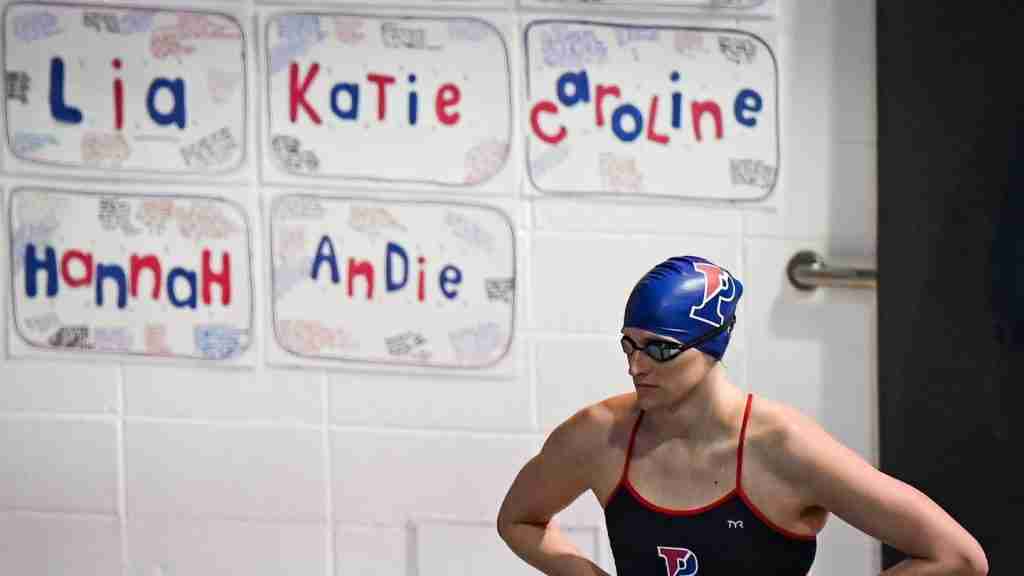In a statement released in response to the new NCAA policy, approved Wednesday evening, the coaches association reiterated its support, alongside the Ivy League, the University of Pennsylvania and Penn Athletics, for the right to Thomas to compete. The coaches further condemned the hostility directed towards him.
“While there is a desire for discussions and rapid resolutions, a thorough, thoughtful, and scientific discussion on the balance between inclusion and equity will take time,” the statement said.
The policy is effective immediately and was approved by the NCAA Board of Governors as university presidents, athletic directors and university athletic administrators opened their annual conference.
Georgetown President John J. DeGioia, chairman of the NCAA panel, framed it as an effort to strike the right balance between equity and inclusion.
“We are steadfast in our support of transgender student-athletes and in promoting equity in college sports,” DeGioia said in a statement. “It is important that NCAA member schools, conferences and college athletes compete in an inclusive, fair, safe and respectful environment and can move forward with a clear understanding of the new policy.”
Under this policy, the participation of transgender athletes in each sport will be determined by the policy established by the governing body of each sport, subject to continued review and recommendations of the NCAA Committee on Competition Safeguards and medical aspects of sport to the Board of Governors.
If the national governing body of a sport does not have a policy, the policy of the relevant international federation will be followed. In the absence of an international federation policy, the NCAA will follow the established policy of the International Olympic Committee for this sport.
Greg Earhart, executive director of the College Swimming & Diving Coaches Association of America, said the NCAA has the budget and access to sufficient scientific expertise to update its transgender policy to reflect the latest research and develop a solution that embraces inclusiveness while ensuring a competitive playing field.
“We appreciate the NCAA’s willingness to draw on the expertise of each national governing body,” Earhart said in an email. “However, yesterday’s decision, especially given its immediate implementation for the winter seasons, means they are abdicating the leadership they are uniquely qualified to provide.”
USA Swimming released a statement supporting inclusiveness and competitive fairness, adding that it was doing its best “to learn and educate us on the appropriate balance in this space.”
The statement said that in November 2021, the IOC asked all international federations to develop eligibility requirements specific to their sports. USA Swimming has since been working with swimming’s international governing body to define these requirements, the release said, and plans to adopt them for elite-level competitions as soon as they are released.
The NCAA has stated that the intent behind its policy is to align the eligibility of transgender athletes to compete with recent policy changes made by the U.S. Olympic and Paralympic Committee and the IOC. About 80 percent of U.S. Olympic athletes are current or former college athletes, according to NCAA President Mark Emmert.
Separately, the NCAA voted Thursday to approve a simplified constitution that will shift decision-making from the national office, which has struggled to find common ground among 1,200 member schools with widely divergent budgets and athletic priorities, to the three divisions and, in turn, individual conferences.
Administrators from Divisions II and III strongly opposed the proposed constitution, expressing discomfort with approving a document that, in their view, did not reflect thoughtful deliberation and only benefited Division I.
Elizabeth City State athletic director George Bright, president of the CIAA Athletic Directors Association, said its provision for a pared-down board of governors fails to ensure adequate voice and representation of historically black colleges and universities.
Nevertheless, the new constitution was approved by 801 votes to 195, well above the two-thirds majority required to adopt it.
Before debate on the 18-page document, Emmert urged delegates to adopt it, saying it “distills the core values of what college sports is all about.”
While the NCAA now says it fully supports the right of athletes to earn money through the commercial use of their names, images and likenesses, Emmert stressed that it does not support a pay-for-play model.
The new constitution will come into force on August 1. The tough decisions will come between now and then as the Division I Transformation Committee, led by SEC Commissioner Greg Sankey and Ohio University Athletic Director Julie Cromer, determine how to exercise their new autonomy.
That could include rewriting the terms of membership in Division I, which generates the vast majority of the NCAA’s revenue through men’s basketball. About 350 schools belong to Division I and largely share in the tournament’s profits.
Taking into account College Football Playoff revenue, which the NCAA does not control, more than $3.5 billion is distributed to schools each year by the NCAA, CFP and Division I conferences, according to the Knight Commission on Intercollegiate Athletics.
The Knight Commission proposed a model that more closely ties revenue distribution and spending to core values of financial transparency and oversight, gender equity, large-scale sports sponsorship, and financial accountability.
The group held a forum ahead of Thursday’s vote to brief NCAA delegates on the proposed financial framework.
“We are encouraged by the leaders we have heard from, who understand that this next phase of work for Division I cannot simply be a repeat of the past,” Knight Commission CEO Amy Perko said by phone.
